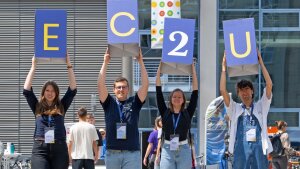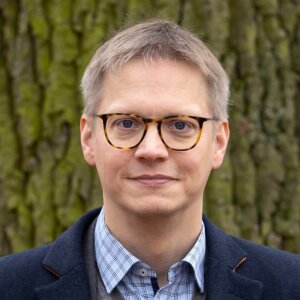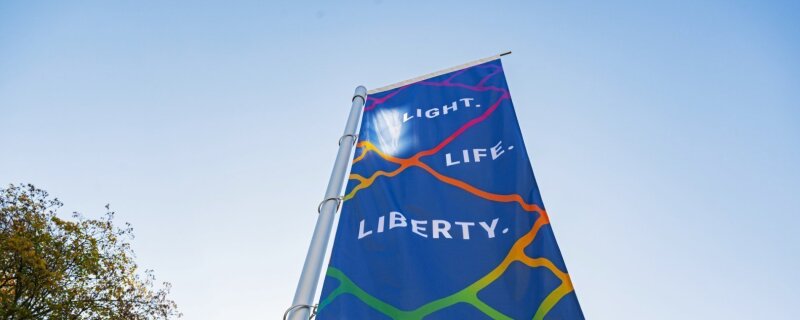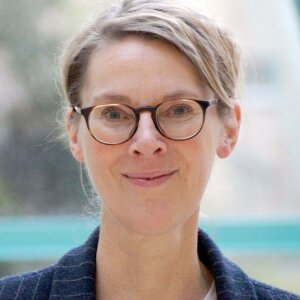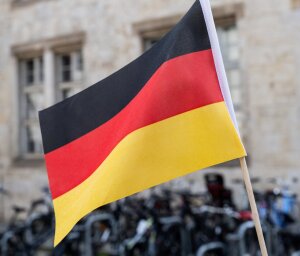News
The European campus continues to grow
University of Jena awarded €2.3 million to fund further internationalization
"EC2U" are the universities in Jena (Germany), Coimbra (Portugal), Alexandru Ioan Cuza in Iași (Romania), Pavia (Italy), Poitiers (France), Salamanca (Spain), Turku (Finland) and Linz (Austria).
Image: Jens Meyer (University of Jena)Thanks to new funding, the University will be able to continue and expand its international activities over the next four years. In 2020, it joined the »European Campus of City-Universities« (EC2U). The EU has now agreed to support the alliance for a further four years through to October 2027 with a total of €14.4 million, of which €1.6 million has been allocated to Jena.
In an accompanying programme at national level, the German Academic Exchange Service (DAAD) is supporting the German universities selected by the EU. The University of Jena has again been successful in the fourth funding round, which began in early January 2024, and will receive €700,000 over the coming four years. [AB]
Microverse film
Screenshot from the film.
Image: Jens Meyer (University of Jena)The Cluster of Excellence »Balance of the Microverse« has developed a 360° film and made it available to planetariums worldwide. The film—entitled »Into the Microverse: Journey through the amazing world of microbes«—provides fascinating insights into this microscopic world.
This 15-minute film is available to download in English and German at: https://www.microverse-cluster.de/en/outreach.htmlExternal link. [Nieber]
Greek culture and language
Bessarion research centre established at the University of Jena
On 8 November, the Bessarion research centre was established with the aim of researching Greek culture and the diversity of the Greek language. Prof. Dr Thede Kahl, Professor of South Slavonic Studies, is working with Dr Sotirios Rousiakis and external collaborators to examine Greek dialects and aspects of Greek culture that have received little attention to date.
The research centre takes its name from Bessarion of Trebizond (born between 1399 and 1408; died 1472), a Byzantine humanist, theologian, church politician, diplomat and cardinal. Serving as Latin Patriarch of Constantinople in exile from 1463, Bessarion rendered great service to Greek culture and language, promoting their spread throughout Europe. »Greek has around ten dialects, some of which differ so significantly that they could almost be considered languages in their own right,« says Prof. Dr Thede Kahl. This is hardly surprising, he adds, given that Greek settlements have been spread far and wide throughout the Mediterranean since pre-Christian times.
Recording and preserving dialectal diversity
Kahl believes that greater appreciation of dialects and vernaculars is essential if the diversity of the Greek language is to be preserved. »We’re interviewing speakers and archiving the recordings,« he explains. The project aims to preserve linguistic variants and make them accessible for others to discover. Another area of exploration for the new research centre is the history of Greek peoples in the Late Ottoman period in Asia Minor. [sl]
Into the final round of the Excellence Competition
Project »Imaginamics. Practices and Dynamics of Social Imagination« at the University of Jena to be developed into a full application for a Cluster of Excellence by August 2024
Prof Dr Johannes Grave is one of the spokespersons for the project »Imaginamics«.
Image: Jens Meyer (University of Jena)The University of Jena, with its new project and existing Cluster of Excellence, has reached the final round of the Excellence Competition, which supports cutting-edge research in Germany. The University submitted three new proposals for Clusters of Excellence, with the »Imaginamics« project now progressing to the full application phase.
In addition, »Balance of the Microverse«—a Jena-based Cluster of Excellence since 2019—can also apply for additional funding through the Excellence Strategy of the German federal and state governments. The deadline for submission of full applications is mid-August. Which large-scale research projects will be realized will be announced in May 2025.
Improving our understanding of social conflicts
Whether it’s climate change, democracy or the pandemic, current debates often give the impression that people live in entirely different, almost irreconcilable worlds of imagination. These »social imaginations« vie for validity and dominance in highly dynamic processes.
These struggles for significance reveal the fundamentally open, negotiated and conflicted character of social coexistence. The project »Imaginamics. Practices and Dynamics of Social Imagination« now aims to investigate these struggles in detail. The project’s name, »Imaginamics«—a portmanteau of »imagination« and »dynamics«—highlights the fluid, dynamic nature of these processes. In addition, there is always a practical side to these dynamics, namely that they are driven by social and political actors. With this in mind, the project not only looks at social imaginations themselves but also the practices of social imagining that produce them.
»We are delighted that the expert jury believes our project outline is pioneering and that we have particular strengths in this field of research. We will now dedicate ourselves to the challenge of refining our ideas in a full proposal. It’s vital that we gain a better understanding of social imaginations and their unique dynamics, which is evidenced not least by the numerous discussions and demonstrations in recent weeks,« says art historian Prof. Dr Johannes Grave, who is a spokesperson of the »Imaginamics« project along with science historian Prof. Dr Christina Brandt and historian Prof. Dr Joachim von Puttkamer.
Cluster of Excellence »Balance of the Microverse« also reaches round two
Existing Clusters of Excellence are also directly eligible to submit full applications. The »Balance of the Microverse« Cluster of Excellence, which is being funded since 2019, will apply for additional funding. This large-scale research project is dedicated to microorganisms. It aims to research the dynamic balance of microbial communities, from the molecular level up to complex ecosystems. Building on the insights gained, new technologies are being developed to maintain or restore microbial balance. The current spokesperson of the Jena Cluster of Excellence is Prof. Dr Kirsten Küsel, Professor of Aquatic Geomicrobiology. [AB]
A flag with the slogan "Light, Life, Liberty" in front of the main university building.
Image: Jens Meyer (University of Jena)New University Council member
Dr Bettina Böhm is a new external member of the Jena University Council.
Image: Leibniz-GemeinschaftIn November 2023, the Senate of the University of Jena appointed a new University Council. As a result, the council now has a new external member: Dr Bettina Böhm (photo), Secretary General of the Leibniz Association.
Böhm, who holds a doctorate in Law, worked in the Legal Office at the University of Bielefeld and as a department head and permanent representative of the Chancellor at TU Dortmund University before becoming the first female Chancellor of the University of Münster in 2004. She was appointed Secretary General of the Leibniz Association in 2018. [JK]
Animal welfare prize
Two scientists from Jena University Hospital received the Thuringia Animal Welfare Award in October 2023. In their work on infection research, Dr Lara Thieme and PD Dr Stefanie Deinhardt-Emmer develop and apply methods that reduce animal experimentation.
While Thieme uses greater wax moth larvae to examine the efficacy of antibiotic combinations in combating bacterial infections, Deinhardt-Emmer is developing an infection model based on human lung tissue to research viral infections.
The Thuringia Animal Welfare Award is presented each year by the Ministry of Labour, Social Affairs, Health, Women and Family. [vdG]
Germany's first political culture monitor
Following in the footsteps of a Thuringian stuy, a team of researchers from Jena, Halle and Mannheim has commenced pilot operation of a nationwide project based on public surveys—and revealed initial results.
German flag in front of the university main building.
Image: Jens Meyer (University of Jena)Launched in 2023, the »Germany Monitor« (Deutschland-Monitor) aims to collect data and conduct comparative analyses on a regular basis to glean insights into short-term changes in social perspectives as well as the stability and changes in attitudes over time.
Taking a Thuringia-focused study as a template, researchers hope that the results of this annual survey will offer information for politicians and the general public, while also providing a basis for scientific analysis and debate. This collaborative project is a joint endeavour between researchers in Jena, Halle (Saale) and Mannheim; in Jena it is based at the Institute of Political Science and the Centre for Research on Right-Wing Extremism, Civic Education and Social Integration (KomRex).
Differences between east and west are narrowing
One of the main findings from the first edition of the Germany Monitor, published at the end of January 2024, is that there is little difference in how people in eastern and western Germany assess their quality of life. The same is also true for people living in cities and in the countryside.
Key challenges in both urban and rural areas include the availability of affordable housing, the shortage of skilled workers and the widening disparity between the rich and the poor. In structurally weak rural regions—and especially in eastern Germany—respondents highlighted the exodus of young people as a particular challenge.
Housing and local environment influence political attitudes
Individual characteristics, as well as housing and the living environment, are decisive in the development of political attitudes. People in eastern Germany are twice as likely to feel left behind as those in western Germany. In addition, people in eastern Germany are more likely to report feeling that political actors show too little interest in their region and do too little to support its economic development. People in structurally weak areas in both eastern and western Germany report feeling left behind more often than those in structurally strong areas. [PM]
